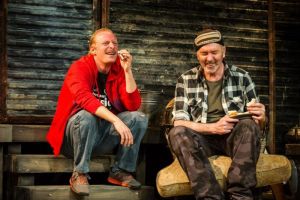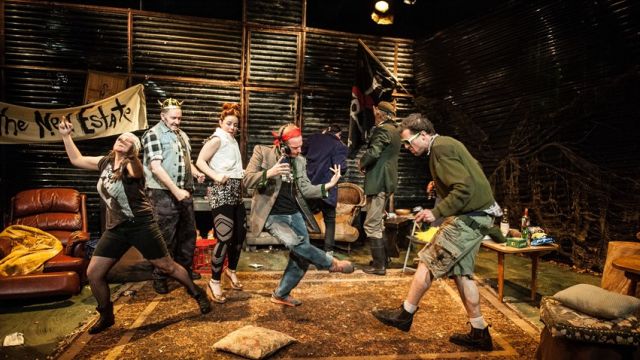Jerusalem
Nicholas Eadie, as Rooster Byron, leads a very large and energetic cast in Helen Tonkin’s deft production of this play she describes as ‘a wildly original hymn to eccentricity … a lament about the erosion of country life, in part a rebuff to the antiseptic modern world’.’
Tom Bannerman’s stage and Blake Garner’s lighting set the mood. The stage is framed by dark, translucent, corrugated sheeting which allows an interaction of lighting that infers different spaces and other times. In front of this is the chaotic shambles of Rooster’s backyard. Old, dilapidated chairs and tables are littered with a mass of bottles – full and empty. A shattered television screen (attacked, we learn later, with a cricket bat the night before) lies downstage. The mess looks so authentic you expect it should smell, but there is also an eerie sort of mysticism implied by subdued light and shadow.

Into this depravity steps a young girl. Dressed in lacy blue, with druid-like silver stick wings, she haltingly sings a few verses of Jerusalem. And leaves. Representatives of the local council step through the mess to serve an eviction notice, one of many, it seems. This one will be enforced that afternoon, St George’s Day. When no one responds to their knocks and calls, they post the notice on the door and leave.
Thus the impending scenario is established.
When the coast is clear, Rooster appears. He is bearded and disheveled. He scratches his stomach, stretches, surveys the scene, ignores the council notice, pours a copious amount of alcohol into some milk, drinks it, then urinates behind the garden wall.
Eadie is almost too plausible in this very demanding role. Rooster is an enigma. He may be a dirty, scruffy alcoholic, the local source of an array of drugs, but he is not a fool. Well-read and intelligent, he has chosen a lifestyle that flies in the face of conformity. He attracts the flotsam of the local lads and lasses. He’s their ‘supplier’ – alcohol, drugs, a place to hang out – but he’s also a father figure of sorts. And he still maintains connections with the town, where it appears he garners some grudging respect.

This is a big and complex character to sustain, but Eadie does so with flair. He finds the many aspects of Rooster’s character by blending playwright Jez Butterworth’s incredible dialogue with tight energy, clipped pauses, unpredictable timing – and brief moments of introspection that expose something deeper and more vulnerable than the funny, strong-minded, hard-drinking, hard-hitting character he shows to the world.
This is a play about a group of misfits. Through them, Butterworth comments on the ravages of progress and broken dreams; on friends and family; on the past and the future. The many scenes of raucous fun, energetic vitality and even cold cruelty are offset with moments of caring and compassion.

This is the sort of play that actors and directors relish. Its messages are deep, its script demanding and its characters are strong and clearly drawn. As such, Tonkin has attracted a very talented cast with whom she has brought Butterworth’s seedy English characters to vivid life. This tight ensemble of fourteen, (too many to name individually), finds the kernel of each character in fast paced action and tellingly timed reactions. That some of them are either a little older or younger than the characters they depict, is compensated by strong, convincing characterisation.
The play was been described as ‘an instant classic’ when it opened in London 2009 and Tonkin’s production proves why! Butterworth’s lovable characters fumble authentically in a restless world of change and broken dreams … and, perhaps, hope.
Carol Wimmer
Photograph © Matthias Engesser
Subscribe to our E-Newsletter, buy our latest print edition or find a Performing Arts book at Book Nook.

